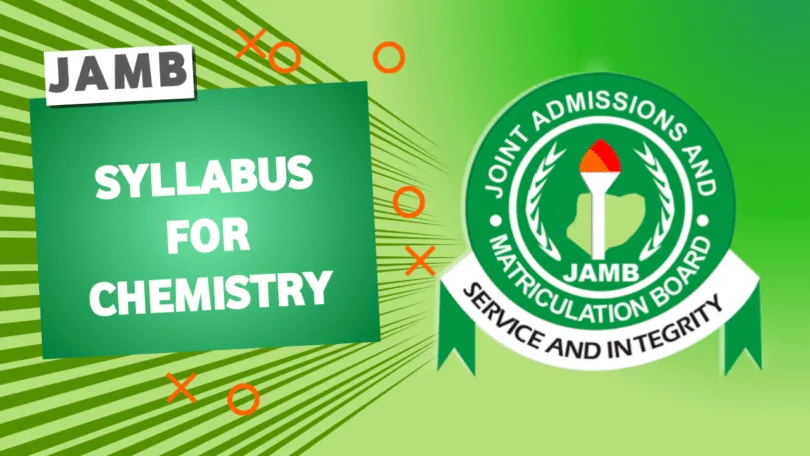If chemistry is amongst your JAMB four subjects for the UTME 2026, then this page is your last bus stop to getting the official JAMB Syllabus for Chemistry for the JAMB 2026 UTME. If this aligns accurately with your aim of being here today, kindly stay calm ans read till the ending paragraph so you can get what you want.
This guide contains what JAMB Chemistry syllabus entails, why you need it, where to get it, how to get it and how to use it effectively for your studies before JAMB exam day. Let’s not waste a time and get into it right away.
JAMB Syllabus for Chemistry 2026 Overview
Here’s an overview of the JAMB Chemistry Syllabus represented in a brief table for easy understanding:
| Title | Detail |
|---|---|
| Exam Type | UTME / Direct Entry |
| Exam Session | 2026/2027 |
| Syllabus Subject | Chemistry |
| File Format | |
| File Size | 300KB |
What Is JAMB Chemistry Syllabus?
The JAMB Chemistry Syllabus is a document that contains the areas of concentration, topics and key focus as designed by the Joint Admissions and Matriculation Board (JAMB) to help candidates focus more on what’s important what’s not important for the 2026 Chemistry UTME.
Why Use the JAMB Syllabus for Chemistry?
Using the JAMB syllabus for Chemistry is like being guided with what to focus on and what to take your attention from and this is simply because the syllabus provides you with the topics that are likely to home the questions and the best areas to concentrate while studying.
Therefore; it is important to make use of the syllabus of you aim for a high score in chemistry this year.
Official JAMB Syllabus for Chemistry 2026/2027
Here are the full contents that the JAMB Chemistry syllabus 2026 contains:
| S/N | Topic | Key subtopics / points to study |
|---|---|---|
| 1 | Separation of mixtures & purification |
|
| 2 | Chemical combinations (stoichiometry & formulae) |
|
| 3 | Kinetic theory of matter & gas laws |
|
| 4 | Atomic structure & bonding |
|
| 5 | The Periodic Table & periodicity |
|
| 6 | Water, air & industrial raw materials |
|
| 7 | Solutions, solubility & colligative properties |
|
| 8 | Acids, bases & salts |
|
| 9 | Energetics / thermochemistry |
|
| 10 | Chemical equilibrium |
|
| 11 | Rates of reaction & collision theory |
|
| 12 | Oxidation, reduction & electrochemistry |
|
| 13 | Qualitative analysis & laboratory techniques |
|
| 14 | Metals & their compounds |
|
| 15 | Non-metals & their compounds |
|
| 16 | Organic chemistry — fundamentals |
|
| 17 | Organic compounds — classes & reactions |
|
| 18 | Chemistry & industry / environmental chemistry |
|
| 19 | Calculations & problem solving (misc.) |
|
| 20 | Revision & exam practice focus |
|
Note: This table is a consolidated syllabus derived from JAMB’s IBASS and reputable syllabus mirrors. For the official, authoritative syllabus and any updates, always check the JAMB IBASS / official JAMB portal (jamb.gov.ng). :contentReference[oaicite:1]{index=1}
Source: compiled from JAMB/IBASS and commonly used syllabus mirrors (candidates should confirm on JAMB IBASS at jamb.gov.ng for official updates).
How To Download JAMB 2026 Syllabus for Chemistry PDF
Downloading the JAMB Syllabus for Chemistry for 2026 UTME is a simple task to do if you are serious about it, below is how you cam actually get your copy as easy as possible :
- Visit the JAMB Syllabus website at (https://www.ibass.jamb.gov.ng)
- Check for the “Syllabus” section and click on it
- Choose “Chemistry” as your subject
- Then locate the “Download” button beside it and click on it
- It will be saved to your phone automatically and you can access it offline anytime, anyday.
- Alternatively, you can proceed to download the JAMB Chemistry Syllabus below
JAMB Syllabus for Chemistry 2026/2027 PDF Download
The JAMB Chemistry syllabus PDF is available here. You just have to click on the “Download” button below to get it saved I to your smartphone without any delay. Get yours now!
DOWNLOAD
How to Use the JAMB Syllabus for Chemistry Effectively
There are many ways of using the JAMB Syllabus for Chemistry to study in preparation for the UTME, but some of these ways are more effective than the other.
Below are the most effective ways you should abide while using the JAMB Chemistry syllabus for studies in preparation for the exam:
- Map out a good timetable: Create a well structured reading timetable for your studies as it is more effective when you’re guided by time while studying than just to take a book to read at anytime
- Get JAMB Chemistry Past Questions: Having past questions from 2000 to 2025 is recommended, you should always solve them after the time to read chemistry expires, that’s how you can tackle JAMB questions without fear
- Join Group Reading: Some people don’t like reading in a group which is fine, check yourself and see, if you’re someone that can cope reading with friends and gaining much, then find like-minded students and read with them to understand chemistry better
- Make use of the recommended textbooks: JAMB also recommends some textbooks for chemistry you should make use of while studying. Try and get at least one to study along using the JAMB Chemistry syllabus.
- Revise Regularly: Regular revision of what you’ve read makes them stick to your brain and that’s what will make you have full confidence in the examination hall.
JAMB Syllabus for Other Subjects
If you wish to check the or see the syllabus for any other subjects, the table below contains them and their syllabus respectively, just select the one you wish to see and click on it.
| Subject | Syllabus Link 🔗 |
|---|---|
| Arabic | See Syllabus Here |
| Use of English | See Syllabus Here |
| Mathematics | See Syllabus Here |
| Physics | See Syllabus Here |
| Biology | See Syllabus Here |
| Agricultural Science | See Syllabus Here |
| Economics | See Syllabus Here |
| Geography | See Syllabus Here |
| Government | See Syllabus Here |
| History | See Syllabus Here |
| Literature-in-English | See Syllabus Here |
| French | See Syllabus Here |
| Fine Art | See Syllabus Here |
| Music | See Syllabus Here |
| Animal Husbandry | See Syllabus Here |
| Igbo | See Syllabus Here |
| Hausa | See Syllabus Here |
| Yoruba | See Syllabus Here |
| Islamic Religious Studies (IRS) | See Syllabus Here |
| Christian Religious Studies (CRS) | See Syllabus Here |
| Commerce | See Syllabus Here |
| Computer Studies | See Syllabus Here |
| Home Economics | See Syllabus Here |
| Principle of Account | See Syllabus Here |
Conclusion
Possessing the JAMB Syllabus for Chemistry is like passing your JAMB Chemistry by 40%; the remaining struggles lie in practicing with JAMB Chemistry Past Questions and then reading effectively, as we’ve guided you above. Make sure you have this syllabus, as it is vital for your UTME preparation to ensure success.





